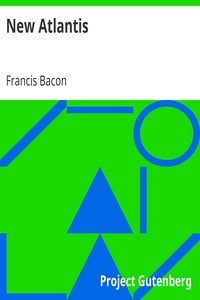New Atlantis by Francis Bacon
"New Atlantis" by Francis Bacon is a philosophical and utopian work written during the early 17th century, specifically around the 1620s, shortly before its posthumous publication in 1627. The book presents an idealized vision of a society that embodies enlightenment principles and the pursuit of scientific knowledge. The likely focus of the text is on the integration of science and ethics in governance and the benefits of knowledge for humanity. The narrative
unfolds as a group of sailors, lost at sea, discovers the mysterious island of Bensalem. Upon landing, they are welcomed with hospitality and compassion from the inhabitants, who embody noble qualities. They learn about Solomon’s House, an institution dedicated to the advancement of knowledge and the study of nature, which reflects Bacon's belief in empirical research and practical application of science. The explorers engage with the island's residents, discussing their governance, customs, and values, and are struck by the sophisticated culture and moral integrity of the society. Bacon uses this fictional setting to articulate his vision of a world enriched by scientific inquiry and influenced by a strong ethical framework, serving as a precursor to modern ideas about research institutions and the role of science in society. (This is an automatically generated summary.)
Read or download for free
| How to read | Url | Size | |||
|---|---|---|---|---|---|
| Read now! | https://www.gutenberg.org/ebooks/2434.html.images | 111 kB | |||
| EPUB3 (E-readers incl. Send-to-Kindle) | https://www.gutenberg.org/ebooks/2434.epub3.images | 112 kB | |||
| EPUB (older E-readers) | https://www.gutenberg.org/ebooks/2434.epub.images | 112 kB | |||
| EPUB (no images, older E-readers) | https://www.gutenberg.org/ebooks/2434.epub.noimages | 97 kB | |||
| Kindle | https://www.gutenberg.org/ebooks/2434.kf8.images | 202 kB | |||
| older Kindles | https://www.gutenberg.org/ebooks/2434.kindle.images | 194 kB | |||
| Plain Text UTF-8 | https://www.gutenberg.org/ebooks/2434.txt.utf-8 | 105 kB | |||
| Download HTML (zip) | https://www.gutenberg.org/cache/epub/2434/pg2434-h.zip | 112 kB | |||
| There may be more files related to this item. | |||||
About this eBook
| Author | Bacon, Francis, 1561-1626 |
|---|---|
| Title | New Atlantis |
| Note | Wikipedia page about this book: https://en.wikipedia.org/wiki/New_Atlantis |
| Credits |
Produced by Michael Pullen and William Fishburne. HTML version by Al Haines. |
| Reading Level | Reading ease score: 63.5 (8th & 9th grade). Neither easy nor difficult to read. |
| Language | English |
| LoC Class | HX: Social sciences: Socialism, Communism, Anarchism |
| Subject | Utopias -- Early works to 1800 |
| Category | Text |
| EBook-No. | 2434 |
| Release Date | Dec 1, 2000 |
| Most Recently Updated | Nov 30, 2024 |
| Copyright Status | Public domain in the USA. |
| Downloads | 1482 downloads in the last 30 days. |
| Project Gutenberg eBooks are always free! | |

